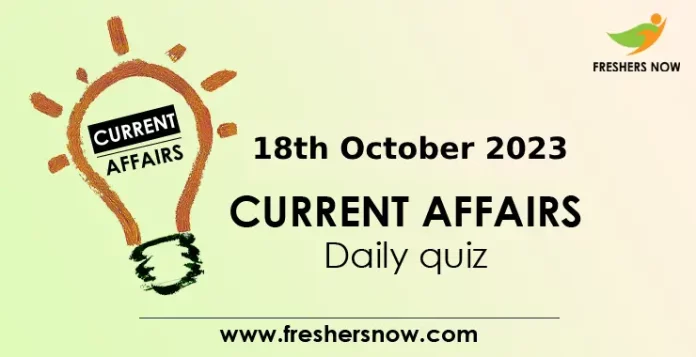
18th October 2023 Current Affairs Quiz: Welcome to the Current Affairs Quiz for 18th October 2023. In this quiz, we will test your knowledge of the latest and most significant events and developments from around the world. These questions will cover a wide range of topics, including politics, economics, science, and more. It’s a great way to stay updated on what’s happening globally and challenge your understanding of the world’s current affairs. So, let’s dive in and see how well you’ve been keeping up with the news!
18th October 2023 Current Affairs | Today GK Quiz
1. What is one of India’s ambitious space plans mentioned in the article?
A. Establishing a space station by 2040
B. Launching a Venus Orbiter Mission by 2025
C. Opening up the space sector to private companies in 2035
D. Creating a roadmap for Mars Lander missions
Answer: A. Establishing a space station by 2040
Explanation: The article mentions India’s plans to establish a native space station by 2035 as one of its ambitious space activities.
2. When did India open up its space sector to private companies, leading to the growth of space tech startups?
A. 2022
B. 2035
C. 2024
D. 2020
Answer: D. 2020
Explanation: The article states that India’s space sector opened up to private companies in 2020, resulting in the growth of over 150 space tech startups.
3. What is the main focus of the vision document associated with the maritime projects inaugurated by Prime Minister Narendra Modi?
A. Enhancing port facilities
B. Promoting sustainable practices
C. Facilitating international collaboration
D. All of the above
Answer: D. All of the above
Explanation: The vision document outlines strategic initiatives for enhancing port facilities, promoting sustainable practices, and facilitating international collaboration.
4. What is the purpose of the Tuna-Tekra all-weather deep-draft terminal, the foundation stone of which was laid by the Prime Minister?
A. Handling coastal shipping
B. Promoting green energy practices
C. Serving as an international trade hub
D. Enhancing ship repair facilities
Answer: C. Serving as an international trade hub
Explanation: The Tuna-Tekra all-weather deep-draft terminal, developed through a public-private partnership, is expected to serve as an international trade hub, handling next-gen vessels and supporting Indian trade via the India-Middle East-Europe Economic Corridor.
5. What is the primary aim of the passenger ferry service from Nagapattinam to Kankesanthurai in Sri Lanka?
A. Enhancing bilateral ties between India and Sri Lanka
B. Boosting local traders’ income
C. Promoting religious tourism
D. Transporting goods between the two countries
Answer: A. Enhancing bilateral ties between India and Sri Lanka
Explanation: The inauguration of the passenger ferry service aims to bolster bilateral ties between India and Sri Lanka.
6. Which of the following is true about the ‘Cheriyapani’ passenger ferry service?
A. The one-way ticket costs approximately Rs 3,000.
B. It operates between Chennai and Colombo.
C. The journey from Nagapattinam to Kankesanthurai takes 2 hours.
D. It offers a generous baggage allowance of up to 40 kg per passenger.
Answer: D. It offers a generous baggage allowance of up to 40 kg per passenger.
Explanation: The ‘Cheriyapani’ passenger ferry service offers a generous baggage allowance of up to 40 kg per passenger.
7. What is the total projected infrastructure investment that India plans to make between fiscal years 2024 and 2030?
A. ₹67 lakh crore
B. ₹143 lakh crore
C. ₹36.6 lakh crore
D. ₹4,500
Answer: B. ₹143 lakh crore
Explanation: India plans to invest nearly ₹143 lakh crore in infrastructure between fiscal years 2024 and 2030.
8. What is the expected share of electric vehicles (EVs) in India’s overall automobile sales by 2030, according to CRISIL’s prediction?
A. 10%
B. 20%
C. 30%
D. 40%
Answer: C. 30%
Explanation: CRISIL predicts that the share of electric vehicles (EVs) in India’s overall automobile sales is projected to reach 30% by 2030.
9. What was the recent decision by India’s Supreme Court regarding same-sex marriages?
A. It legalized same-sex marriages in the country.
B. It called for the parliament to address the matter rather than the judiciary.
C. It declared same-sex marriages as unconstitutional.
D. It established legal protections for LGBTQ rights.
Answer: B. It called for the parliament to address the matter rather than the judiciary.
Explanation: The Supreme Court of India declined an appeal to legalize same-sex marriages and emphasized that the matter should be addressed by the parliament rather than the judiciary.
10. What fundamental rights did Chief Justice Dhananjaya Yeshwant Chandrachud mention in relation to same-sex unions?
A. The right to deny benefits to same-sex couples.
B. The right to choose a life partner.
C. The right to change gender identity.
D. The right to determine medical procedures.
Answer: B. The right to choose a life partner.
Explanation: Chief Justice Chandrachud emphasized that the right to choose a life partner is a core element of one’s right to life and liberty under Article 21 of India’s constitution in the context of same-sex unions.
★★ You Can Also Check ★★



